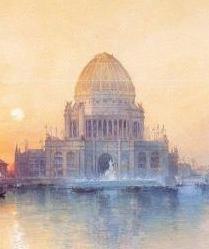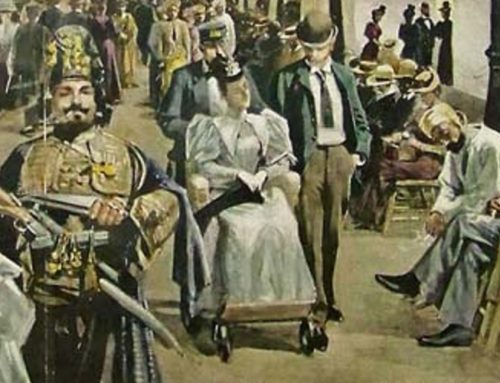Chicago knows how to handle vicious and unfounded attacks from bitter New Yorkers. Perhaps that resilience grew out of the practice of self-defense initiated during the years of the World’s Columbian Exposition. Chicago’s response to “Chicago As Chicago Is,” the New York Sun’s diatribe against the host of the 1893 World’s Fair [reprinted in Part 1, Part 2, and Part 3], was as swift and sharp as the local pigstickers. We offer here a selection of responses from other news outlets.

The Chicago-based periodical The Illustrated World’s Fair responded forcefully to the insults from Charles Dana and the New York Sun in their June 1892 issue:
Mr. Dana’s Diatribe
What is professionally known as a roast was recently committed by the New York Sun on Chicago. A roast is a hostile newspaper article, ordered to lie written a priori. A journalist, who may have formed no opinion or a favorable opinion, is commanded to prepare a diatribe on a subject, and he is counted a poor craftsman if, knowing the least in the premises, he cannot bring forth the bitterest tirade. Under the operations of the Sun‘s system this misfortune has befallen Chicago. An article of nearly a page appeared in the Sun of Sunday, May 29, 1892, wherein our English language has been taxed to express the hatred and envy of Mr. Charles A. Dana touching Chicago and the Fair.
It is believed by some people that Mr. Dana is insane. If he be insane, it is a very mean man gone daft.
The Chicago Inter Ocean (May 31, 1892) shot back at the New York paper. [The mentioned Simon Cameron (1799–1889) served as President Abraham Lincoln’s Secretary of War at the beginning of the U.S. Civil War.]
A Thoroughly Mugmump Concoction
The New York Sun devotes nearly a page to a review of “Chicago As Chicago Is,” that is what one of “those d—d literary fellers” of old Simon Cameron’s detestation is pleased to find it funny and lucrative to portray it to be. It is a thoroughly Mugmump concoction, just the kind of a mess that, in human form, has made Dana’s gorge rise since Cleveland made a New York State appointment that Dana didn’t like, and the Mugwump and his idol became in the old editor’s outraged sense a byword and a hissing.
The following day (June 1, 1892), the Chicago Inter Ocean continued their rebuttal, offering this poised response to the Sun. The Chicago paper called out editor Charles Dana’s sour grapes for his earlier failure in the newspaper business in if-you-can-make-it-there-you-can-make-it-anywhere Chicago and then offers to kiss and make up.
Chicago is content to be judged fairly. She is, perhaps, more strong than graceful, but she is cultivating the friendship of the graces, and will “get there” with them in due season.
Nearly everybody who comes to Chicago is successful in Chicago, and everybody who achieves success discerns graces in the city and fine qualities in the people where and among whom he achieved success. From which cause Chicago and its people many admirers, and the number of them increases daily. We venture to say that Chicago has more friends than any other city upon earth, because more men now living have achieved success here than anywhere else.
But there are men of note who have wooed but not won success in Chicago … Hence it is not strange that Mr. Dana prefers New York, in which he has been wonderfully successful, to Chicago, in which he was not successful. But while preferring New York he should not hold Chicago to be of no account. When he failed in his Wester suit, Chicago and he were very young folks. Chicago is not deriding her quondam lover; he should not affect to despise the charms of his erstwhile flame. Let him come hither in 1893 and note how finely the country lass to whom he paid unprofitable court has developed into a dashing city maiden, and notably confess in the presence of such a beauty that:
’Tis better to have loved and lost
Than never to have loved at all.
For he who has seen Chicago and has not loved her is devoid of taste, and no one will bring such an accusation against Mr. Dana.
The South Bend (IN) Tribune (June 1, 1892), printed this succinct statement making the same case:
There is bare a possibility that when Mr. Charles Dana wrote his famous editorial about Chicago in last week’s Sun, he had in mind the non-appreciative conduct of Chicago citizens when he attempted to establish a paper there shortly after the war.
When the Illustrated American reprinted a condensed version of the New York Sun essay in their June 18, 1892, issue, it offered this preface about “what a man with a facile pen can write when not restrained by the love of truth.”
That admirable morning newspaper, the New York Sun, has recently published an article, entitled “Chicago as Chicago Is,” purporting to be the “impartial observations of a man who can see and smell.”
Chicago the place, and Cleveland the man, are the targets at which the able editors of this enterprising journal are constantly aiming their shafts. Chicago has offended because it has fairly and squarely earned the honor of giving space to the greatest exposition the world has ever seen; Cleveland has offended because in the New York democracy he is a Democrat Tammany Hall cannot seduce from paths of honor and honesty.
The article on Chicago is interesting as an example of what a man with a facile pen can write when not restrained by the love of truth. It is a choice example of glaring misrepresentation. The editors, with rare humor, stated that it was “the observations of a man who can see and smell,” intimating thereby that the writer was bereft of those three other senses which constitute the equipment of a man capable of making accurate and comprehensive observations.
With delightful frankness, the writer in his comments states that “these notes” only apply to a part of the people of Chicago, or, to quote his precise language: “These notes apply almost entirely to what may be called the civilized and naturalized population of Chicago. That element is much smaller than the most pessimistic of us have any idea of. When, however, we discover that there are less than two hundred and seventy-five thousand native Americans in the community, which the uninformed European mistakes for the typical American city of the continent, we get a new notion of the absurdity of inviting all Europe to come and behold an American celebration of Columbus by a populace largely composed of aliens shovelled in from all parts of the Old World.”
But Chicago does not come in for all that is miserable in the writer’s opinion. Before he comes to his grand effort, he gives us an overture. In this he sweeps over the broad area from Pittsburg to Chicago, and scornfully comments upon the fertile acres, the thriving towns, the cattle, and the people.





Leave A Comment